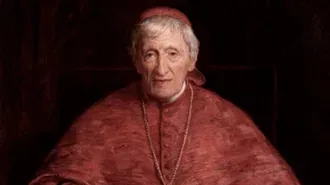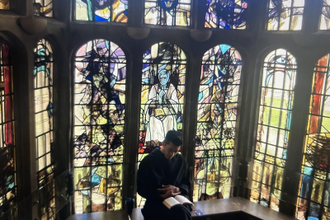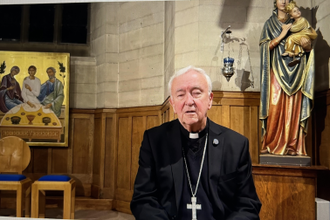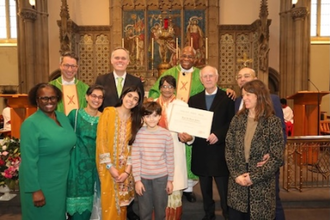Saint John Henry Newman - Doctor of the Church

St John Henry Newman
Source: CBCEW
On Saturday 1 November 2025, the Solemnity of All Saints, Pope Leo XIV will declare Saint John Henry Newman a Doctor of the Church and Co-Patron of Catholic Education, alongside Saint Thomas Aquinas.
Newman is not the first Oratorian among the now 38 Doctors of the Church. Saint Francis de Sales (1567-1622), raised to this honour by Blessed Pius IX during Newman's lifetime in 1877, founded the Congregation of the Oratory of Saint Philip Neri in Thonon-les-Bains and remained its Provost until his appointment as Bishop of Geneva.
Newman's cardinalitial motto Cor ad cor loquitur - 'Heart speaks to heart' - was drawn from the writings of Francis de Sales, with whom he felt deep spiritual affinity.
Being proclaimed a Doctor of the Church is not merely an honorary title; it is the Church's recognition that a saint's thought continues to offer insight and inspiration not only for theology, but for the life of faith of the entire people of God. The essential criterion for this title is 'eminent doctrine' (eminens doctrina).
Newman is widely regarded as one of the most important Christian thinkers of the modern era. Among his seminal contributions stand his theory of the development of Christian doctrine, his appreciation of the role of the laity, his theology of conscience, his vision of education, and his philosophy of belief and certitude. His remarkable intellectual apostolate continues today, as his writings guide countless men and women toward the fullness of Christian faith in the Catholic Church.
Pope Leo XIV noted especially that the new Doctor of the Church "contributed decisively to the renewal of theology and to the understanding of the development of Christian doctrine".1 During his Oxford years, Newman's extensive study of the doctrinal controversies of the early Church led him to realize that recourse to antiquity alone could not safeguard the truth of Christianity. The living Church, through her Magisterium, bears witness to the legitimate development of doctrine that began already in the Apostolic Age and has continued throughout history.
In a letter to Pope Leo X, Erasmus of Rotterdam (d. 1536) buttressed the great project of Renaissance Humanism to return to the sources (ad fontes) with the claim that one could extract Christian doctrine "in a much purer and more vigorous way … from the very sources."2 Newman, however, illustrated his own theory of development with a different image: "It is indeed sometimes said that the stream is clearest near the spring. Whatever use may fairly be made of this image, it does not apply to the history of a philosophy or belief, which on the contrary is more equable, and purer, and stronger, when its bed has become deep, and broad, and full". 3
Newman saw in this principle of authentic development a sign of inner vitality: the truth remains unchanged, yet its expression deepens and grows clearer over time. In this way, he laid the theological foundation for defending the continuity of the Catholic faith against the onslaught of historical criticism. He identified seven "notes" of genuine development - among them preservation of type, continuity of principles, and power of assimilation. Taken together, these serve as criteria for distinguishing true growth from corruption or distortion.
As a cardinal, Joseph Ratzinger praised Newman's idea of development as one of "those fundamental Catholic concepts that have by no means been sufficiently thought through".4 Elsewhere, Ratzinger noted that Newman had placed "in our hands the key for integrating historical thought into theology … to think theologically in historical terms, and thus to recognize the identity of faith through all its developments".5
Newman bore witness to Christianity in its full and authentic sense, often at great personal cost. Tirelessly, he worked to equip his fellow Catholics to meet the intellectual challenges of the modern age. At the same time, he showed profound pastoral sensitivity: he understood the inner struggles of those he addressed and and could sympathise with their perplexity.
The proclamation of Saint John Henry Newman as a Doctor of the Church is an invitation to rediscover his writings born of lifelong prayer and study. To read Newman is not merely to encounter a great intellect, but to walk with a soul led by the kindly light of God's truth and convinced that heart and mind belong together.
[1] Pope Leo XIV, Angelus Address, 28 September 2025.
[2] Opus Epistolarum Des. Erasmi Roterodami, ed. Percy Scafford Allen, Hellen Mary Allen and Heathcote William Garrod, 12 vol. (Oxford: Clarendon Press, 1906-1958), vol. II, 185 (no. 384).
[3] John Henry Newman, An Essay on the Development of Christian Doctrine, 14th impression (London: Longmans, Green, and Co., 1909), 40.
[4] Joseph Ratzinger, "The Ecclesiology of the Second Vatican Council," in Communio 13 (1996), 241-242 (translation modified).
[5] Joseph Ratzinger, "Presentation on the Occasion of the First Centenary of the Death of Cardinal John Henry Newman" (28 April 1990), in L'Osservatore Romano (English Edition), 1 June 2005, 9.


















